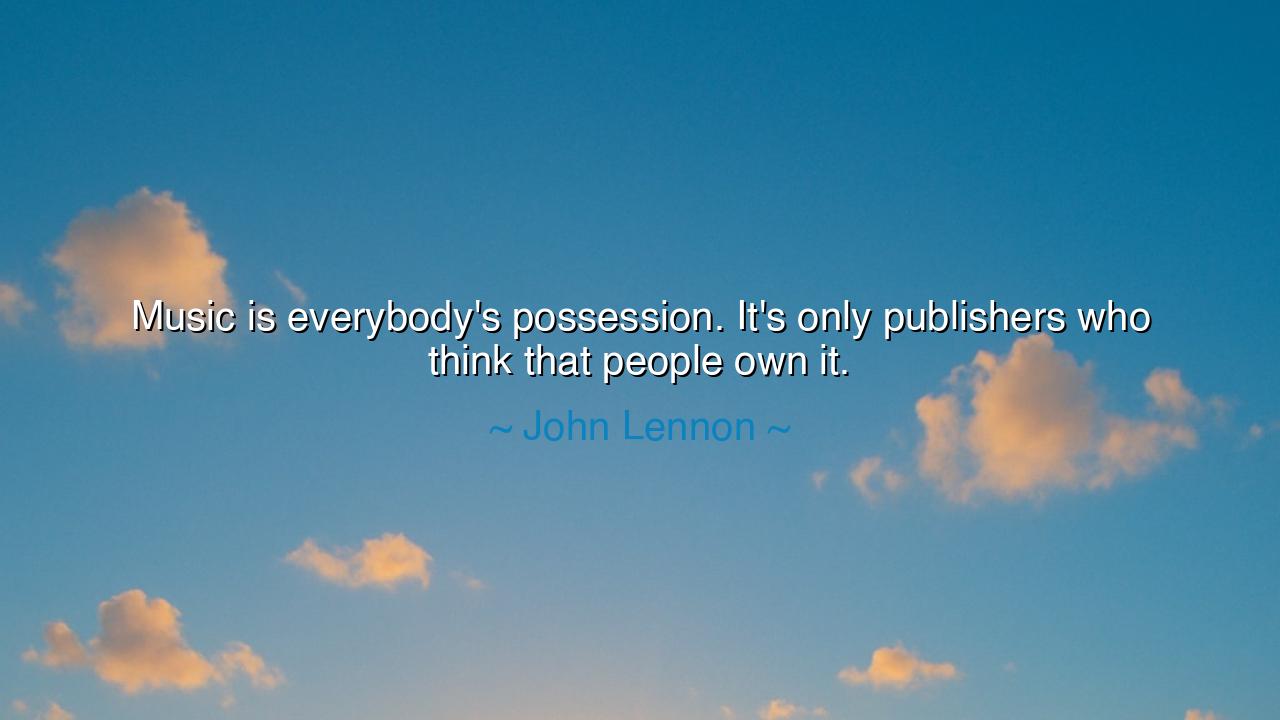
Music is everybody's possession. It's only publishers who think






John Lennon, prophet of song and rebel of spirit, once declared: “Music is everybody’s possession. It’s only publishers who think that people own it.” These words are not the idle musings of a dreamer but the cry of one who had witnessed music lifted into the heavens by common voices, then bound and chained by the greed of men. His saying is at once a celebration and a warning: a celebration of music as the universal inheritance of humankind, and a warning against those who would confine it behind walls of ownership and profit.
To call music “everybody’s possession” is to honor its true nature. Music is not born in contracts or in vaults—it springs from the beating of the human heart, from the rhythm of footsteps, from the cry of the newborn and the hymn of the dying. Long before publishers and profits, men and women sang to the skies, to their gods, to each other. No single hand could claim ownership, for the song belonged to all who heard it, all who joined their voices in the chorus. In this way, music is like fire: it spreads freely, lighting many torches without ever diminishing its flame.
Yet Lennon, with a sharp tongue, named the shadow upon this light. “It’s only publishers who think that people own it.” Here he points to the hunger of those who reduce sacred art to property, treating melodies like merchandise, and charging tolls for entry into the temple of song. This is not to say that artists should not be honored or sustained, but rather that the spirit of music cannot be bound. For music, once sung, belongs to the air, to the people, to the ages. To pretend otherwise is to cage the wind.
History itself testifies to this truth. Think of the folk songs carried on the lips of generations—songs with no known author, passed from mother to child, from farmer to worker, from sailor to wanderer. These songs crossed borders, changed tongues, and evolved with time, yet they belonged to no one and to everyone. The spirituals of enslaved Africans in America, born in anguish yet infused with hope, gave rise to blues, gospel, and jazz. They were not owned by corporations but by the community of souls who sang them. Here lies Lennon’s truth: the possession of music is communal, not commercial.
The meaning of his words is both heroic and humbling. They remind us that music is one of the few gifts that unites all of humanity. It does not discriminate between rich and poor, between nations or creeds. A song heard in the streets of India may stir the heart of a wanderer in Europe; a melody hummed in Africa may awaken recognition in America. When the first note is struck, all walls fall away, and we stand not as divided tribes but as a single chorus.
For those who hear this teaching, the lesson is clear: honor music not as a possession to hoard, but as a gift to share. Sing without fear, play without shame, and know that in doing so you take part in humanity’s oldest inheritance. Support the artist, yes—but do not let the merchant’s hand convince you that music can be caged. When you sing a song, it is yours; when your neighbor sings it, it is his; and when the world joins in, it belongs to all.
Practical actions rise naturally from this wisdom: share music freely with others, teach songs to the young, learn from the songs of different cultures, and never treat music as the property of the few. Let your gatherings be filled with song, for in doing so, you proclaim that music is not bought but lived. In your solitude, let music be your companion; in your community, let it be your bond.
Thus Lennon’s words echo as both defiance and benediction: “Music is everybody’s possession.” Remember this, and you will never be alone, for wherever there is song, there is fellowship. And though men may claim to own it, though contracts may bind it, the truth remains: music belongs not to the few but to the many, not to the marketplace but to the soul of mankind.






AAdministratorAdministrator
Welcome, honored guests. Please leave a comment, we will respond soon